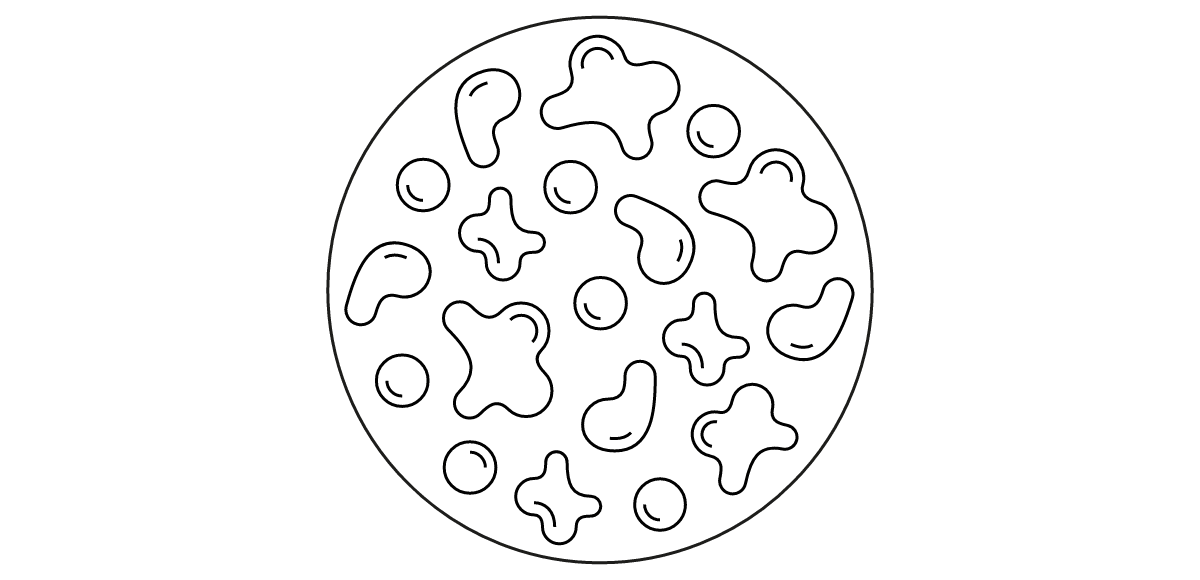Your guide to oily skin
What is oily skin? You know, besides being skin that’s oily. Spoiler alert: It’s so much more than that! Read along and get tips and tricks on how to handle oily skin.

Oily skin type seems pretty self-explanatory (thanks to whoever came up with human-word-names for medical terms).
Because at its very core, oily skin is exactly what the name delicately indicates: skin that’s oily.
However, we’re gonna go a little deeper in this article - beyond the oily surface and down to where the really greasy stuff is hiding (sorry not sorry).
What are the characteristics of oily skin?
Well, one very obvious characteristic of oily skin is: Oil (duh).
But all jokes aside, oily skin can often feel unpleasant and give your face a shiny look due to the overproduction of oil. The oil sits on the surface of your skin, often leading the skin to feel unclean. This is, of course, due to the oil, but also due to the fact that people with oily skin often are more prone to developing acne. Also, if you wear makeup, you may have a hard time keeping it in place due to the oil. So all in all, it can feel like a lot’s going on.
It can be difficult to identify your skin type, but even though everyone can experience oily skin from time to time, people with an overall oily skin type will probably tell you that if you have it, you’ll know it for sure.
So, what’s actually causing your skin to be oily?
As promised, we’re gonna explore this skin type even further and take a look at what’s actually causing your skin to produce an excessive amount of oil.
For starters, let’s just blame it on genetics. Some people naturally have larger sebaceous glands (the tiny oil-producing pockets within your skin), and we can’t really do anything about that.
But honestly though, we can’t blame it all on genetics (would’ve been easy, though). Your skin type can change over time due to both internal and external reasons.
We can have oily skin without necessarily having an oily skin type. Your hormones can have ups and downs, for example when you’re a teenager or if you’re pregnant. And when your hormone levels are rising, so is your oil production. That’s just your body’s fun way of keeping you on your toes.
Being too harsh on your skin can also mess up the balance within the sebaceous glands. Over-exfoliation and over-washing in an attempt to clean out your pores can (surprisingly enough) have the opposite effect than desired. When your skin is stripped from its natural moisture (the oil), the skin reacts by overproducing oil in an attempt to moisture the skin.
Other impacts on oily skin include the changing seasons (winter time tends to dry your skin out, while you may see a more free flowing oil production in the summer), stress, air pollution, cosmetics and medication (so many things, we know and we’re sorry to burst your bubble).
So there’s really no way out of it, then? Well. No, but oily skin actually does have some benefits!
There’s a reason why your skin naturally produces oil: It preserves and protects your skin. This also means that people with oily skin tend to have thicker skin and less wrinkles (woohoo).
The whole thing about oily skin (and skin in general, honestly) is that we need to find the balance between not having too much oil, but still enough to maintain your skin’s natural moisture.
Which leads us to the next chapter:
How to care for oily skin
We’ve kiiiinda already dropped hints here and there as to how you should care for your oily skin. It’s all about balance.
Let go of the urge to reach for the harsh products that’ll strip your skin. Instead, look for a gentle cleanser that will help you remove excess oil, dirt, and makeup, while maintaining your skin’s natural protective barrier (remember - when you dry out the skin, your oil glands will compensate 😬 )
There’s also a number of ingredients that will help you towards a more balanced skin. Niacinamide is a soothing ingredient that supports oily skin type, while regulating oil production (yay). Also the well-known king of moisture, hyaluronic acid, will help you keep that moisture without clogging your pores. Oh, and ceramides and retinol are both champs when it comes to restoring, maintaining, and refining your skin.
If you have oily skin, this may not come as a surprise to you: People with oily skin are more prone to acne, breakouts, and blackheads. This is due to the excessive oil production which can lead to clogged pores if not cared for properly (or well, it will probably lead to it anyway because acne kinda sucks that way).
Sorry to end on such a depressing note. We’ll make it up by reminding you that NØIE can help you with your oily skin - first of all by taking away the stress of finding the right product for you, but secondly by providing customised skincare made specifically for you and your skin’s needs.